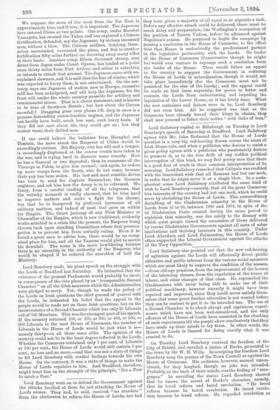Lord Rosebery went on to defend the Government against the
attacks levelled at them for not attacking the House of Lords sooner. They had, he said, received "no mandate" from the electorates to reform the House of Lords, nor had they been given a majority at all equal to so gigantic a task. Before any effective attack could be delivered, there must be much delay and preparation, like Wellington's occupation of the position of Torres Vedras, before he advanced against Napoleon's armies. He proposed to begin the campaign by passing a resolution in the House of Commons, to the effect that that House is undoubtedly the predominant partner in the legislative partnership with the Lords. No leader of the House of Commons (Conservative though he might be) would ever venture to expunge such a resolution from the books of the House. Then would follow an appeal to the country to support the Government in reducing the House of Lords to subordination, though it would not take place immediately (for the Commons must not be punished for the sins of the Lords) ; and the appeal would- be made on that issue expressly, for power to fetter and, restrain the Lords from embarrassing and impeding thc. legislation of the Lower House, as it has lately done. What the new restraints and fetters were to be, Lord Rosebery did not even hint. All he suggested was that as the- Commons have already bound their kings in chains, they shall now proceed to fetter their nobles "with links of iron."


















































 Previous page
Previous page